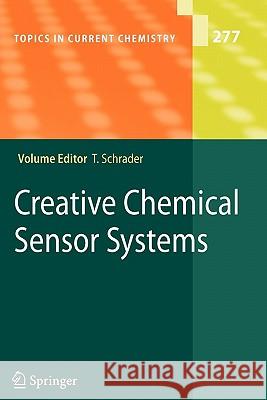Creative Chemical Sensor Systems » książka
Creative Chemical Sensor Systems
ISBN-13: 9783642090752 / Angielski / Miękka / 2010 / 303 str.
Since several excellent books have appeared on the issue of chemical and biochemical sensing, this compendium concentrates on recent creative new approaches using chemical means for the detection and quanti?cation of - portant analytes. These are presented either from a technical viewpoint or fromtheperspectiveofselectivemolecularrecognitionwitharti?cialreceptor molecules. Consequently, the entire book is subdivided into two categories, i. e., natural targetsand detection techniques. In the ?rst part, the challenging task of sensing peptides and proteins as wellassaccharidesisaddressedfromseveralperspectives: Smalllibrarieswith maximum diversity are ef?ciently used to reach high af?nity and selectivity of arti?cial hosts for short peptide sequences. Preorganized aromatic vessels are tailored for certain protein epitopes and shown to selectively address the prion protein, and a new conjugation technique operating at physiological conditions on helix-loop-helix motifs, leads to protein binders of exquisite af?nity. Finally, elegant sensor systems for multifunctional carbohydrates in their naturalform, whichuse theprinciple ofphoto-induced electrontransfer for ?uorescence detection, are presented. The second part of this book is devoted to creative detection techniques employing chemical processes: Liposomes with integral self-assembled - acetylene lipid areas show an intense blue color, which gradually changes to red if biological analytes of various sizes speci?cally interact with emb- ded hosts. Principal component analysis and arti?cial neuronal networks are novel methods to quantitatively analyze complex mixtures. An alternative - proach uses arti?cial peptidic pores, which are able to release self-quenched ?uorophoresthataresubstitutedbytighterbindinganalytes











